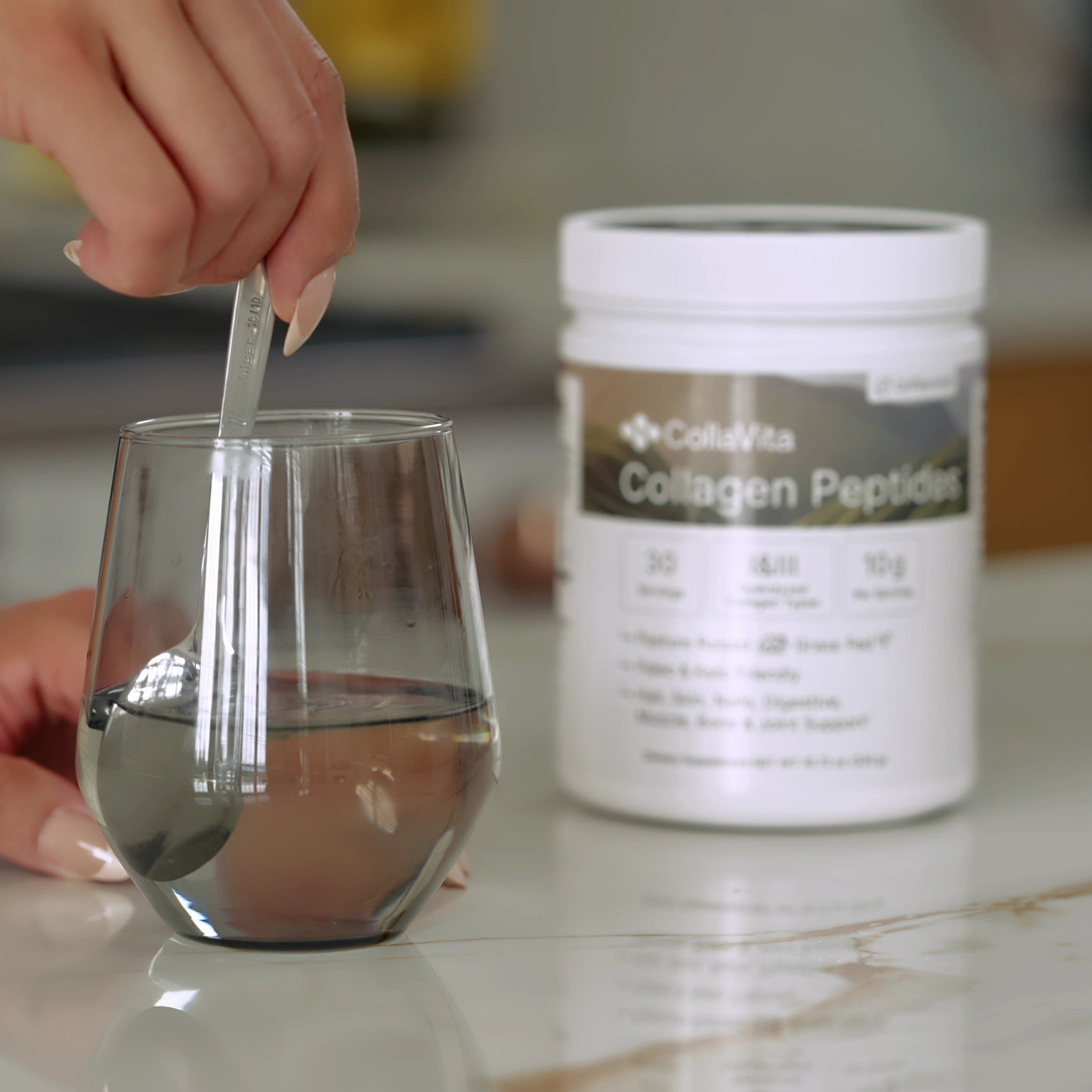How Does Vitamin C Boost Collagen Production?
Vitamin C is essential for collagen synthesis. Collagen is a protein consisting of three strands wrapped around each other, and between these strands, there are cross-links that provide strength and elasticity. These cross-links cannot be formed without vitamin C. In the absence of adequate hydrolyzed collagen with vitamin C, collagen fibers do not adhere properly, leading to a structure that is fragile and prone to rupture. This may cause gum bleeding, bruised skin, and slowed wound healing.
Vitamin C is also a powerful antioxidant that prevents collagen damage by fighting free radicals in the body. This protects the structure of collagen and prevents signs of aging.
Furthermore, vitamin C plays a dual role in collagen development, increasing collagen synthesis while shielding it from oxidative stress and inflammation, according to the study in the Mediators of Inflammation [1]. The study also shows that a mixture of vitamin C, collagen peptides, resveratrol, and astaxanthin was effective in reducing levels of pro-inflammatory markers, such as IL-6 and MMP-2, which are involved in collagen breakdown, in human tenocytes (tendon cells).
By inhibiting these inflammatory processes, vitamin C supports the preservation and production of healthy collagen. Vitamin C's powerful antioxidant properties also reduce the production of reactive oxygen species (ROS), which can otherwise lead to oxidative damage in collagen fibers.
Why Should You Use Collagen with Vitamin C?
Vitamin C is an essential nutrient for collagen production. It supports the enzymes necessary for forming and binding collagen fibers, making them even stronger and more stable. Vitamin C also helps collagen be better absorbed.
Collagen with vitamin C supplements work hand in hand to make skin healthier and firmer, less prone to wrinkles and other symptoms of aging, and much more supple and hydrated overall, according to the study in the Nutrients [2]. The effects of hyaluronic acid (HA), vitamin C, and collagen on the bodies of 87 women were clearly observed during the 16 weeks of research by Slovenian researchers.
How to Choose the Best Collagen with Vitamin C Supplement?
When taking collagen c hydrolysate with vitamin C supplements, look for hydrolyzed collagen products. Because it is hydrolyzed into smaller peptides, this form is better absorbed by the body. Hydrolyzed collagen with vitamin C containing 90–1500 mg of vitamin C is the most indicative of quality.
Look for additional nutrients such as copper and hyaluronic acid. Choose trusted brands, avoid artificial additives, and ensure the supplement's form (powder, capsule, liquid) is practical. The daily dosage usually ranges between 5000 and 10,000 mg of collagen and 500 mg of vitamin C, but you can adjust it according to your individual needs.
When and How Should You Take Collagen with Vitamin C?
The optimal method to maximize the effects of collagen supplements is to take them alongside vitamin C, as the latter is essential for collagen formation. The health of your skin, joints, and tissues depends on your ability to produce collagen and heal wounds effectively; recent research has demonstrated that enough vitamin C intake is critical for these processes.
Vitamin C helps the body make collagen; once it does, it makes collagen stronger and more useful. Supplementing with vitamin C or eating a diet rich in citrus fruits, berries, and green vegetables should be enough to get most people to their daily recommended intake of 95 milligrams.
To get the most out of collagen, take it with vitamin C first thing in the morning or with food for the greatest absorption. No matter what form your collagen supplement takes—powder, liquid, or capsules—taking it with a vitamin C source will maximize its effectiveness in helping your body's natural collagen production [3].
Are There Any Side Effects of Collagen with Vitamin C?
Collagen and vitamin C supplements are generally safe but may cause side effects in some people. High doses of vitamin C can cause digestive problems (diarrhea, gas, bloating) and increase the risk of kidney stones. Excessive vitamin C can also upset the copper balance. Oxidized forms of vitamin C supplements can be harmful, so natural and non-GMO products should be preferred.
Due to the potential presence of sugar or artificial sweeteners, collagen supplements have the potential to aggravate gastrointestinal issues. Be careful with the dosage and stay away from anything that can trigger an allergic response. Collagen production can also be enhanced by maintaining a nutritious diet and drinking enough water.
FAQ About Collagen with Vitamin C
The following are frequently asked questions and their corresponding answers regarding the collagen and vitamin C combination.
How much vitamin C should I take with collagen?
The optimal dosage of vitamin C varies according to the specific requirements, the particular ingredients that make up the supplement, and the current health situation of the person. In most cases, taking 500 milligrams of vitamin C daily should be enough. However, there are situations where higher doses, like 5-20 grams, can be necessary, such as when supporting the immune system or speeding up wound healing. On the other hand, excessive vitamin C intake should be handled carefully, and potential adverse effects (such as gas, bloating, diarrhea, etc.) should be taken into account.
Can anyone take collagen and vitamin C supplements?
In general, collagen benefits for everyone and is safe for most people. But in these situations, checking with your doctor before taking collagen supplements is best.
- Pregnant or breastfeeding women: Before taking any supplements while pregnant or nursing, women should talk to their doctor.
- People with chronic diseases: In particular, people with kidney stones or other diseases should consult their doctor before taking supplements.
- Allergy sufferers: If you are allergic to any of the ingredients in the supplement, you need to avoid using these supplements.
- Medication users: It is important to consult your doctor, as some medications may interact with collagen or vitamin C supplements. For example, people taking statins can take vitamin C supplements, but it is important to discuss the necessity of statins with their doctor.
How long should I take collagen and vitamin C supplements?
The duration of vitamin C supplements and collagen take can also vary according to your individual needs.
A dose of this vitamin can be helpful, particularly in the winter or when you are sick. Vitamin C supplements, taken at times of high stress or after a long day at work, can help the body cope with stress and keep the immune system strong. A daily dose of 5 grams of vitamin C is recommended.
Collagen supplements are a great choice for counteracting the signs of aging and promoting healthy skin, hair, nails, and joints. Results typically start showing within a few weeks.
Will collagen supplements make me gain weight?
Collagen supplements generally do not cause weight gain. It is a type of protein, and proteins are the body's basic building blocks. Collagen supplements can even help with weight loss by providing a feeling of satiety. However, some collagen for loss weight may contain sugar or artificial sweeteners. Therefore, when choosing a supplement, it is important to check the ingredients and avoid supplements with sugar. Also, other ingredients in supplements (for example, thickeners or fillers) can cause digestive problems in some people, such as bloating or gas.
Do collagen and vitamin C supplements interact with other supplements?
Supplement interactions must be carefully considered before using collagen and vitamin C products. If you are taking zinc supplements, check your copper levels because zinc can lower copper levels. Zinc is important for copper and collagen production.
Many vitamins and minerals are water-soluble, so even in high doses, they are excreted from the body, so don't usually be afraid of taking too much. However, if you take iron supplements, have them checked for copper deficiency, as copper deficiency may not correct anemia.
Vitamins B and C can be taken together, as vitamin C aids folate metabolism, which is essential for serotonin production. However, Vitamin C taken with bioflavonoids may be more effective. Liposomal vitamin C is better absorbed but is usually made from corn derivatives, which may be a problem for some people. Non-acidic buffered vitamin C does not cause stomach upset, so it may be preferable.
Conclusion
Collagen and vitamin C are, thus, an ideal trio for enhancing skin health, lowering aging indicators, and bolstering joint health. Improving skin suppleness and postponing the signs of aging are both promoted by vitamin C, which supports appropriate collagen formation. You can get better skin and joints as a result of improved collagen supplement absorption. Carefully following the recommended dosage is essential since this blend of nutrients promotes internal and external health. To age healthily, taking vitamin C and collagen supplements may be helpful.
SOURCES
(1)- Marzagalli, Monica, Battaglia, Stefania, Raimondi, Michela, Fontana, Fabrizio, Cozzi, Marco, Ranieri, Francesca R., Sacchi, Roberto, Curti, Valeria, Limonta, Patrizia, Anti-Inflammatory and Antioxidant Properties of a New Mixture of Vitamin C, Collagen Peptides, Resveratrol, and Astaxanthin in Tenocytes: Molecular Basis for Future Applications in Tendinopathies, Mediators of Inflammation, 2024, 5273198, 17 pages, 2024.
(2)- Žmitek, K.; Žmitek, J.; Hristov, H.; Rogl Butina, M.; Keršmanc, P.; Pogačnik, T. The Effects of Dietary Supplementation with Collagen and Vitamin C and Their Combination with Hyaluronic Acid on Skin Density, Texture and Other Parameters: A Randomised, Double-Blind, Placebo-Controlled Trial. Nutrients 2024, 16, 1908.
(3)- New analysis of landmark scurvy study leads to update on vitamin C needs August 16, 2021 University of Washington

















